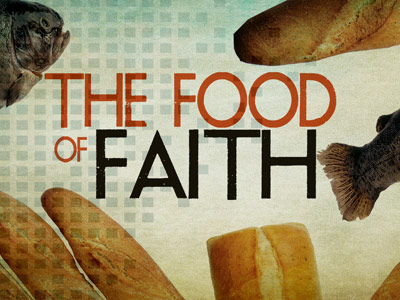-
A Focus On Food Series
Contributed by Glenn Pease on Mar 29, 2021 (message contributor)
Summary: Jesus is the only person in the Bible who is so thankful for food that it becomes a prominent part of His life's story. Here in the record of His feeding of the 4000 Jesus is recorded as giving thanks 2 times in two verses.
Many years ago when Rudyard Kipling was a popular writer it was reported that he was getting 10
shillings for every word he wrote. Some students at Oxford University, who were not impressed
with Kipling, sent him 10 shillings with a request that he send them one of his very best words. He
cabled back one word-thanks!
This is certainly one of the very best words in any persons vocabulary. I became curious about
what use Jesus made of this word thanks, and to my surprise I discovered that Jesus used the word
more often for food than all other uses put together. He is not revealed as thanking God for nature,
for people, or for the temple in which to worship, but over and over again Jesus is portrayed as
giving thanks for ordinary, everyday, commonplace food. The main New Testament word for
thanks is eucharisteo. Out of the 9 times it is on the lips of Jesus 8 of them are in reference to food.
Now, lest you think this is a Greek word somehow related to food, let me assure you this is not the
case. The primary use of this word in the New Testament is from the pen of Paul, and he hardly
ever used it for food. In all of the letters of Paul he is always giving thanks for people.
The evidence overwhelmed me because Jesus is the only person in the Bible who is so thankful
for food that it becomes a prominent part of His life's story. Here in the record of His feeding of the
4000 Jesus is recorded as giving thanks 2 times in two verses. First He thanks God for the 7 loaves
in verse 6, and then He takes the few small fish in verse 7 and gives thanks again. The second time
He uses a synonym that can also mean praise. He thanked God for the bread and praised God for
the fish. This is the only miracles Jesus performed where He expresses His thanks twice for the
same meal.
In the feeding of the 5000 He only gave thanks once. The only other place we see this double
thanksgiving is also connected with food, but it is not a miracle meal. It was the Last Supper, and
Jesus in Luke 22 first took the cup and gave thanks, and then He took the bread and gave thanks.
Jesus was a thankful person, and even though in His deity He was the creator of all food, in His
humanity He was thankful for food. The dinner table is a frequent piece of furniture in the life of
our Lord. A focus on the role of food in His life will magnify the reality of His humanity.
Mark's Gospel is a food-filled Gospel. The only miracles that all four of the Gospels record is the
miracle of feeding the 5000. Mark goes beyond the others and records the feeding of the 4000
which Luke and John do not record. He tells of the eating and drinking and feasting and banquets of
Jesus. Jesus ate with just about everybody. There was the tax collectors, the sinners, and even the
Pharisees. Meals were such a major matter that the disciples of Jesus were suspected of not being as
spiritual as John's disciples and Pharisees, for they fasted, but the disciples of Jesus did not. In Mark
2:19 Jesus defends their non-stop feasting by pointing out that you do not fast at a wedding, and that
was the atmosphere of His ministry. He was the bridegroom, and the they were the guests, and so
feasting was always in order.
The Pharisees did not like the crowd that He ate with, nor the frequency of His eating. It just did
not seem very spiritual to them, but to Jesus it was very spiritual, and it was that for which He had
so much gratitude. We know the Pharisees made a big issue about Jesus healing on the Sabbath,
but they also made a big issue about His Sabbath eating habits. His disciples would pick off some
grain as they walked through the grain field on the Sabbath. The Pharisees charged them with
breaking the law. Jesus defended them and said in Mark 2:25-26, "Have you never read what
David did when he and his companions were hungry and in need? In the days of Abiathar the high
priest, he entered the house of God and ate the consecrated bread, which is lawful only for priests to
eat, and he also gave some to his companions."
Jesus plays the role of the lawyer, and in defending his disciples he appeals to precedent as any
good lawyer would. Meeting the need of hunger is so basic that it has priority over legalistic and

 Sermon Central
Sermon Central



